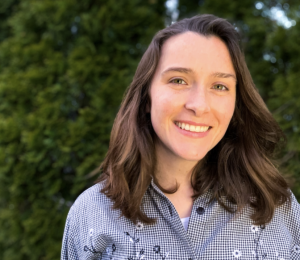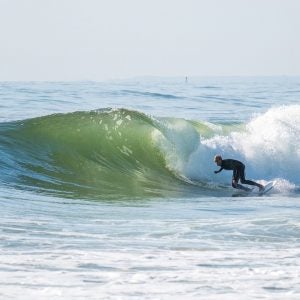Attached below are brief overviews of the Marine Affairs graduate thesis and dissertation research from the class of 2020. All of these students successfully defended their theses and dissertations in the spring 2020 semester. Congratulations graduates- fair winds and following seas!
Jessica Vandenberg, PhD in Marine Affairs
The Human Dimensions of Coral Reef Restoration: A case study in the Spermonde Island of Indonesia
Advisors: Dr. Amelia Moore & Dr. Carlos Garcia-Quijano
My research explores the human dimension (i.e. socio-cultural, political, historical and economic attributes) of coral reef restoration in order to assess how these interventions impact the wellbeing and livelihoods of island people in Indonesia. Specifically, I investigated whether intended social objectives of providing food security through reef restoration were realized in local communities and whether local values of reefs aligned with restoration practices and goals. I also evaluated the social consequences and challenges that emerged as a result of the restoration intervention– mainly how various perceived and actual forms of dispossession developed. My work highlights the importance of understanding the complex social histories, micro-political systems, cultural values and social networks that exist in small island communities and that heavily influence outcomes of conservation interventions.
Madeleine Fenderson, M.A. Marine Affairs
Constructing Cooperation from the Seabed Up: Assessing Commercial Fisher’s Preferences on the Design of Offshore Wind Farms
Advisor: Dr. David Bidwell
There are more than a dozen lease sites designated for the implementation of offshore wind energy generation from Massachusetts to the coast of North Carolina, yet the long-term impacts of these large wind farms on the domestic commercial fishing industry are largely unknown. There has been opposition from commercial fishermen regarding offshore wind development in the United States, and design and configuration of turbines has been a significant topic of concern. The purpose of my research was to understand commercial fishermen’s preferences on different design features and the perceived risks associated with fishing within the farm.

Christina Hoenow, M.A. Marine Affairs
MPAs and Marine Citizen Science: Accessibility in the Monterey Bay National Marine Sanctuary
Advisor: Dr. Amelia Moore
Marine citizen science has exploded onto the marine conservation scene over the past two decades. While primarily centered in highly inequitable and exclusionary activities like scuba diving or boating using marine citizen science to increase the equitability of marine management and conservation initiatives around the world can frequently prove fruitless. Prompted by her experiences as a scuba instructor and having grown up on the California coast Christina chose to investigate the relationship between California’s network of marine protected areas and marine citizen science programs. Through a purely qualitative, determinedly anti-colonial lens Christina conducted a thorough investigation of what is actually happening on the central coast of California to make marine citizen science programs so prolific and what impact they are having on California’s marine protected areas.

Kim Ohnemus, M.A. in Marine Affairs
The (En)tangled Web They Weave: Stakeholder Perceptions of the Large Whale Take Reduction Plan Process
Advisor: Dr. Tracey Dalton
Kim Ohnemus is a Cape Cod native and currently in her second year in the Marine Affairs Master Program. Her research focuses on the Atlantic Large Whale Take Reduction team, a stakeholder team that develops regulations to reduce interactions between large whales and commercial fishing operations. By interviewing team members, Kim has been able to gain insight into the strengths and weaknesses of this executive process and what factors drive consensus in diverse teams. She hopes that her findings will help to inform and create more inclusive and transparent stakeholder processes that promote conservation while minimizing industry impacts. 
Cassandra Wilson, M.A. Marine Affairs
Underlying values in Coral Restoration: Responses to the Coral Crisis
Advisor: Dr. Amelia Moore
Controversy has long existed among global coral experts over how to solve the coral crisis. This problem extends to the U.S. and its coral reef areas, but research on how this controversy influences restoration efforts in Florida is lacking. My research focused on Florida as an important and accessible case study to gain a closer look at the motivations behind coral conservation efforts taking place in real time. Through this research, I gained insights into the many factors that affect coral restoration management in Florida, specifically looking at the relationship between experts’ values and decision-making.
Clea Harrelson, M.A. in Marine Affairs
Stealth Sanctuary: The Challenge of Protection at Stellwagen Bank National Marine Sanctuary
Advisor: Dr. Amelia Moore
My research focused on understanding how the social politics of marine protected areas impact management decisions through a case study of Stellwagen Bank National Marine Sanctuary. I used qualitative research methods, including interviews, participant observation, and document analysis, to inform my work. This site provides valuable insights into how people involved with management at Stellwagen perceive protection of marine space and offers opportunities to reconceptualize protection as a multi-faceted endeavor that includes non-ecological elements such as education and outreach.
Kasie Costa, M.A. Marine Affairs
Public Perceptions of Single-Use Plastic Bans in RI
Advisor: Dr. Richard Burroughs
Kasie Costa, originally from Massachusetts, centered her thesis research around plastic pollution in Rhode Island surrounding the initiative to ban various single-use plastic products statewide. She surveyed residents statewide to gain perspective on how the residents would feel towards these bans and if their views varied between municipalities with a plastic bag ban already in place and the municipalities that do not. Her research findings provide insight to policy makers in Rhode Island providing a road map on how to approach these plastic bans to gain the most support from their residents. She has also been contacted by one municipality interested in her data to see how their residents specifically feel about banning various single-use plastics to potentially pass single-use plastic bans in their town.
Grant Tyler, M.A. Marine Affairs
Offshore wind and community benefits in Kitty Hawk, NC
Advisor: Dr. David Bidwell
Grant’s research focuses on fostering public acceptance of offshore wind development through the use of community benefits. His research was a case study of an island community in North Carolina . In the future, he hopes to expand on this study by conducting a multiple case study along the east coast of various coastal communities’ perceptions on community benefits.

